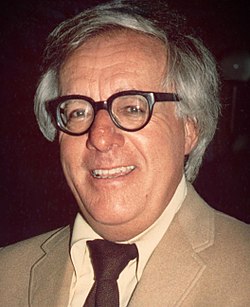Ray Bradbury Quote
God bless the lawn mower, he thought. Who was the fool who made January first New Year’s Day? No, they should set a man to watch the grasses across a million Illinois, Ohio, and Iowa lawns, and on that morning when it was long enough for cutting, instead of ratchets and horns and yelling, there should be a great swelling symphony of lawn mowers reaping fresh grass upon the prairie lands. Instead of confetti and serpentine, people should throw grass spray at each other on the one day each year that really represents Beginning!
Ray Bradbury
God bless the lawn mower, he thought. Who was the fool who made January first New Year’s Day? No, they should set a man to watch the grasses across a million Illinois, Ohio, and Iowa lawns, and on that morning when it was long enough for cutting, instead of ratchets and horns and yelling, there should be a great swelling symphony of lawn mowers reaping fresh grass upon the prairie lands. Instead of confetti and serpentine, people should throw grass spray at each other on the one day each year that really represents Beginning!
Related Quotes
About Ray Bradbury
Ray Douglas Bradbury (US: BRAD-berr-ee; August 22, 1920 – June 5, 2012) was an American author and screenwriter. One of the most celebrated 20th-century American writers, he worked in a variety of genres, including fantasy, science fiction, horror, mystery, and realistic fiction.
Bradbury is best known for his novel Fahrenheit 451 (1953) and his short-story collections The Martian Chronicles (1950), The Illustrated Man (1951), and The October Country (1955). Other notable works include the coming of age novel Dandelion Wine (1957), the dark fantasy Something Wicked This Way Comes (1962) and the fictionalized memoir Green Shadows, White Whale (1992). He also wrote and consulted on screenplays and television scripts, including Moby Dick and It Came from Outer Space. Many of his works were adapted into television and film productions as well as comic books. Bradbury also wrote poetry which has been published in several collections, such as They Have Not Seen the Stars (2001).
The New York Times called Bradbury "An author whose fanciful imagination, poetic prose, and mature understanding of human character have won him an international reputation" and "the writer most responsible for bringing modern science fiction into the literary mainstream".
Bradbury is best known for his novel Fahrenheit 451 (1953) and his short-story collections The Martian Chronicles (1950), The Illustrated Man (1951), and The October Country (1955). Other notable works include the coming of age novel Dandelion Wine (1957), the dark fantasy Something Wicked This Way Comes (1962) and the fictionalized memoir Green Shadows, White Whale (1992). He also wrote and consulted on screenplays and television scripts, including Moby Dick and It Came from Outer Space. Many of his works were adapted into television and film productions as well as comic books. Bradbury also wrote poetry which has been published in several collections, such as They Have Not Seen the Stars (2001).
The New York Times called Bradbury "An author whose fanciful imagination, poetic prose, and mature understanding of human character have won him an international reputation" and "the writer most responsible for bringing modern science fiction into the literary mainstream".
